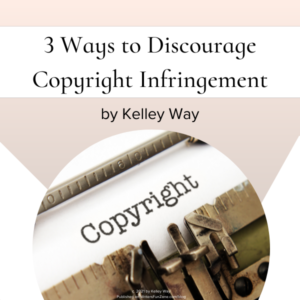3 Ways to Discourage Copyright Infringement by Kelley Way
 Let’s welcome back monthly columnist Kelley Way as she shares with us “3 Ways to Discourage Copyright Infringement.” Enjoy!
Let’s welcome back monthly columnist Kelley Way as she shares with us “3 Ways to Discourage Copyright Infringement.” Enjoy!
***
Unfortunately, copyright infringement is rampant in the Age of the Internet.
It is so easy to copy a photo or share a song or e-book, many people don’t even realize that what they’re doing is infringement.
And then you also have the person who is deliberately and systematically copying your work for their personal gain.
Fortunately, there are a few ways to discourage infringement.
1. Contact the infringer
In some cases, it may be enough to simply reach out and notify the person that you have a copyright to the work, and that they are infringing on that copyright.
Some people genuinely don’t realize they’re infringing, and a polite notification will prompt them to take down the work with an apology.
This is the recommended route when a harsher response may alienate your fanbase – for example, when dealing with a fan whose enthusiasm for your work went in the wrong direction.
2. Send a cease and desist letter
When the first option doesn’t work, or the infringer is clearly a bad actor who wouldn’t listen to a polite request, you can up the ante and send a cease and desist letter.
This is a fancy way of saying, “stop infringing or I will sue you.”
You can have a lawyer send this letter so the infringer knows you mean business for maximum effect.
To be clear, options 1 and 2 are not mutually exclusive.
For example, Netflix got some media attention for the clever way they handled an unlicensed “Stranger Things” pop-up bar.
By sending the infringers a tongue-in-cheek cease and desist letter that made several references to the show, Netflix told the infringers they appreciated their enthusiasm for the show and graciously permitted the pop-up bar to remain open for its full run, but to please shut it down after that and not do this again.
If the infringement is online, you can also send a DMCA takedown notice to the website host and have them remove the content.
For more information on that, you can see my previous article.
3. Sue the infringer in court
When all else fails, you can always file a copyright infringement lawsuit in court.
This is the most time-consuming and expensive option, but if all goes well, you’ll get a court order to make the infringer stop, plus the infringer will have to pay you money to make up for your lost sales.
Bear in mind, your copyright must be registered with the Copyright Office before you can file the lawsuit, and there’s no guarantee you’ll win.
If you’re considering this route, talk to a copyright litigator to make sure you have a good case and that the potential payout will be worth the cost of the litigation.
There is a fourth option on the horizon: on December 27, 2021, the Copyright Office will open the Copyright Small Claims Court to deal with copyright infringement claims worth less than $30,000.
I’ll talk more about that as it gets closer, but in the meantime, you can rely on one of the three methods I’ve outlined above.
If you have any questions about these options, you are welcome to email me at kaway@kawaylaw.com.
***
Want to read more articles like this one Writer’s Fun Zone? Subscribe here.
***
ABOUT THE AUTHOR
Kelley Way was born and raised in Walnut Creek, California. She graduated from UC Davis with a B.A. in English, followed by a Juris Doctorate. Kelley is a member of the California Bar, and an aspiring writer of young adult fantasy novels. More information at kawaylaw.com.







